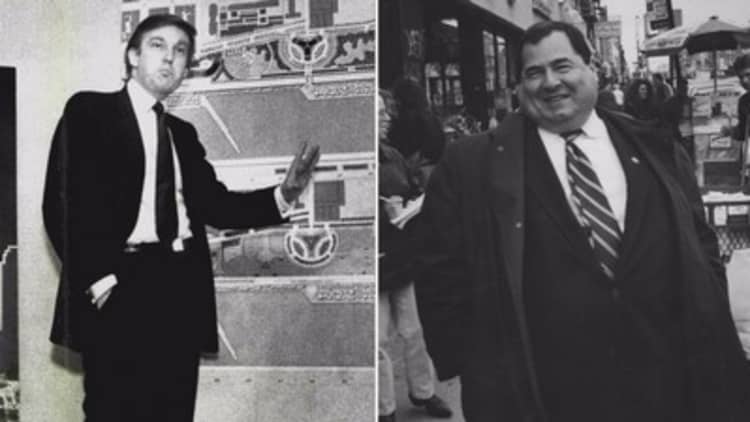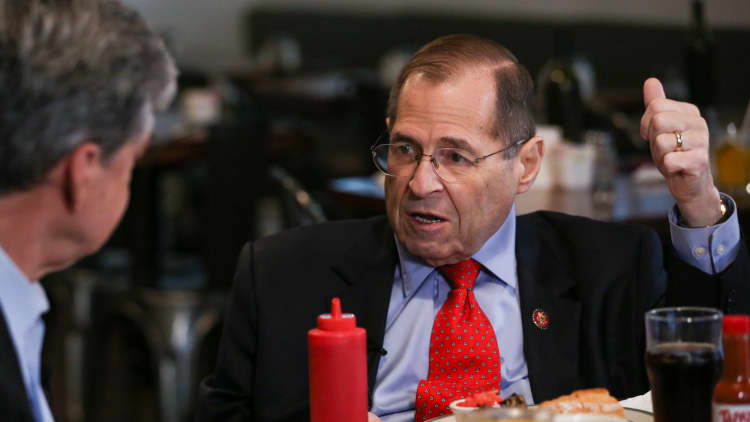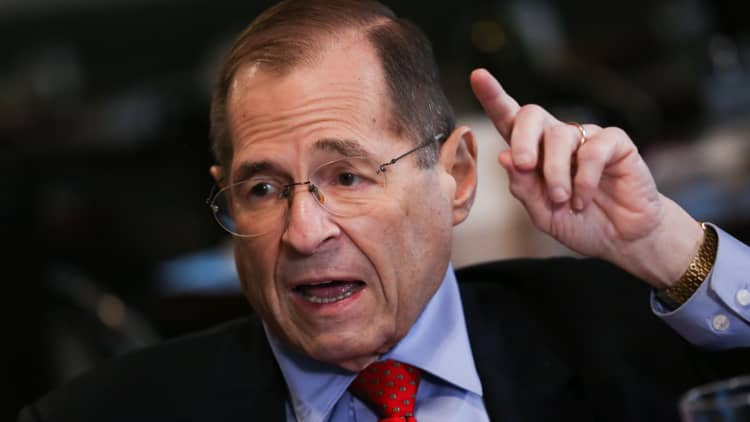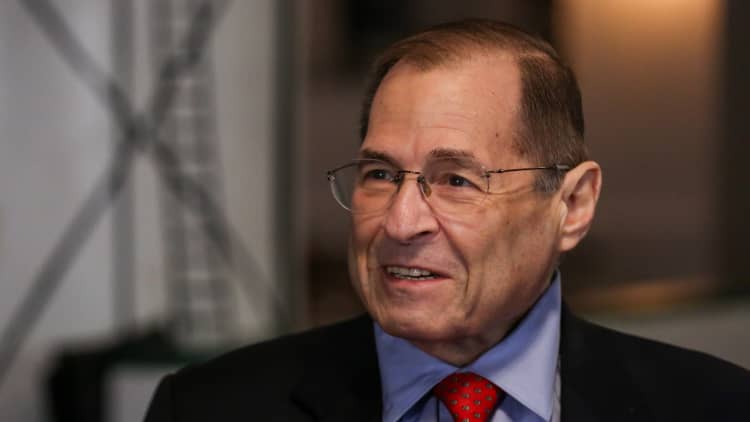After a quarter-century in Congress, Rep. Jerry Nadler of New York stands on the brink of an outsize role in American political life.
As Judiciary Committee chairman in the Democratic-controlled House, Nadler leads his party's efforts to exercise oversight of President Donald Trump and his administration. If Democrats pursue the fourth serious presidential impeachment effort in American history, Nadler would wield the gavel when it starts.
Nadler, now 71, first took on the future president as a New York assemblyman in the 1980s when he joined the resistance to a massive Trump development project on Manhattan's Upper West Side. Trump won that battle, though his development got downsized. In today's confrontation, the entire country holds a stake.
Nadler and House Speaker Nancy Pelosi of California face difficult political choices. Trump drew less than 20% of the 2016 vote in both their districts, but some Democratic colleagues fear a 2020 backlash from impeachment. So party leaders have moved cautiously in the wake of the Trump-Russia special counsel report.
Over scrambled eggs at Westville Hudson in the lawmaker's New York City district, Nadler sat down to discuss the challenge. What follows is a condensed, edited transcript of the discussion.
John Harwood: Unlike many people in Congress, you actually have experience from the 1980s in confronting Donald Trump, or disagreeing with Donald Trump. What did you learn from that experience?
Jerry Nadler: I didn't actually learn that much because we didn't have very much personal contact at all. I think I met him two or three times personally. But he threw a lot of money and political influence around. And he wanted to get his way. And I battled him because I disagreed with him.
John Harwood: The story I read said he called you Fat Jerry.
Jerry Nadler: Yeah, but, was it at that time or later? I don't remember. When he first proposed the gargantuan project, everybody opposed it. It was ridiculous, a 150-story building surrounded by seven Chrysler Buildings. Much too big. And, this runs from 1985 to 1991. In '91, a compromise was reached. A much smaller project, but still gargantuan. And a lot of the groups that had opposed it supported it, and some of the civic groups did, because you're going to get a nice park and various other things. Most of the other legislators switched from opposition to support. I did not. I didn't like the compromise either. You know, one man's compromise is another man's sellout.
John Harwood: Does anything about that experience inform your approach to the current situation?

Jerry Nadler: Not really. We knew he was unscrupulous, but you knew that from just his general dealings in New York. I just thought he was overbearing and felt he could get his way no matter what, because he had the immense money and the resources. And that was wrong.
John Harwood: Do you think of that experience as a fight with Donald Trump that you won, unequivocally, because it wasn't built?
Jerry Nadler: No, we didn't win. The so-called compromise, which was much too big and large, was built. The rail yard stopped. No, I don't think it was a win at all. Quite the contrary.
John Harwood: What do you think he is doing now? There are some people who believe that Trump is trying to goad the Congress into impeaching him because he thinks he will get a political benefit from that. There are others who think he's just an impulsive person who acts the way he acts, and it's not a larger strategy.
Jerry Nadler: It's more the second than the first. I think he is very impulsive, he's very willful, and he's very ignorant. I mean, unlike Richard Nixon, who knew exactly what he was doing when he was violating the law and violating norms and so forth, he just goes ahead. He doesn't know what the law is. He doesn't know what the constitutional history is. He doesn't know the implications of half of what he does.
John Harwood: Do you agree with Speaker Pelosi, who said the other day that he is self-impeaching by his conduct, making it impossible for you to avoid that?
Jerry Nadler: He's making it increasingly difficult. Our major goal has to be to vindicate the rule of law. No questions are being answered about any subject. And then, when subpoenas are being issued, there's a blanket command, disobey all subpoenas. Nobody should testify, and nobody should give documents to Congress. Well, that's a way of neutering Congress, of making sure that Congress can't do its job, of turning the country into a dictatorship of a monarchical president. You can't function if you don't have information.
John Harwood: That's why you call it a constitutional crisis?
Jerry Nadler: Yes.

John Harwood: He ridiculed that idea, said that you guys were just putting on a show and rallying your political base. The president says, "3.2 percent economic growth in the first quarter. What are you talking about? I'm making people's lives better." The idea of a constitutional crisis is not something people can see, feel, or touch.
Jerry Nadler: That's right, but you know, we fought a Revolutionary War over that. It affects people's lives ultimately. Whether the president is doing a good job in the economy or not is one question. He may be. But, if he's destroying all the norms, and destroying all the practices, and destroying the laws, and arrogating all power to the presidency so that the people through Congress have nothing to say, that's a very different crisis.
John Harwood: Is that an argument that you can make the American people see and understand and accept?
Jerry Nadler: I think so. I mean, we have to hold hearings, and we have to get people to testify. And not just on the collusion with the Russians and obstruction of justice, but in all kinds of issues where they're refusing. The president goes out and lies, he says "I'm for health care." And he's trying to eliminate it in court. We have to get information on that so we can act, if necessary.
John Harwood: I was reading over the weekend about the impeachment of Andrew Johnson in the 19th century. And the advocates of impeachment then struggled with the question of, do we articulate narrow, concrete, easily understandable grounds for going after him? Crimes that he might have committed, or clear violations of his oath of office, or do we articulate a broader argument, but namely that the impeachable violation is that he was thwarting the aims of the Civil War, or the outcomes of the Civil War by interfering with the creation of a new society. Do you think of it that way as you're investigating President Trump? And if there's a larger issue about him and his conduct, what is it?
Jerry Nadler: Certainly on many issues, you have to deal with the specifics. And the larger issue – well, you've got three issues, really.
It starts off with, this president and his campaign. If you read the Mueller report, there was tons of evidence that they knew the Russians were interfering with the election on their behalf. They welcomed it, they wanted it, and they coordinated with it. Colluded, in a word. There's no question about that.
John Harwood: Despite Bill Barr saying over and over, "no collusion."
Jerry Nadler: Bill Barr is just a liar. And, he's just representing the president.
The second clear conclusion is, there are 12 episodes of obstruction of justice. Beyond all that is the basic question: They're trying to say that Congress, representing the American people, can't get information, and therefore, can't function. The effect of that is to make the president a monarch, to make him a dictator. And that's what we've got to fight.
John Harwood: Do you believe, in fact, that the president is compromised by Russia?
Jerry Nadler: Trump was saying throughout the campaign, "I have no dealings in Russia. I have no dealings of whatever kind." We now know that in fact, they were negotiating for Trump Tower Moscow right to the end of the campaign. They were lying and lying about it.

Putin knew that they were having these negotiations. He knew that Trump was lying to the American people about it, and that gave him leverage, because he could have revealed that during the campaign. Whether there is leverage now, I don't know. There are a lot of questions.
John Harwood: You actually think Bill Barr is just lying, as opposed to being a defender of the person who put him in the attorney general's job?
Jerry Nadler: You could have two interpretations of Bill Barr's motives. The less charitable interpretation is he's doing whatever he has to do, to protect the president personally. And he'll hide whatever he has to hide. Lied may be too strong a word, but he certainly misrepresented very strongly what was in the report.
The more charitable interpretation is that he simply believes in the so-called unitary theory of government, and this tyrannical theory that any president cannot obstruct justice, that as long as he believes that he didn't do anything wrong, he can stop an investigation. Which is a terrible doctrine because it would mean that you can't investigate any president for doing anything. And that he is acting now to protect that point of view.
They're both dangerous. One would have him being very dishonest, the other would have him being honest but very dangerous to the republic.
John Harwood: There was a poll that was done recently in which a solid majority of Americans said they believed that before he was president, President Trump committed crimes. Is that relevant?
Jerry Nadler: The president can be impeached only if two things, only for misuse of presidential power while president or for cheating in the election that gave him the presidency. Other than that, if he did something terrible before he was president, he robbed the bank, that's not impeachable. It's a crime, but it's not impeachable.
John Harwood: Do you believe he's committed crimes while in office?
Jerry Nadler: Yes I do. Mueller lays out very strong evidence of a number of obstructions of justice. Those are crimes. Yes, of course he did.
John Harwood: I wonder if the larger idea is that Democrats think that Donald Trump is a con man, and they are justified in finding ways to get a con man out of the White House.
Jerry Nadler: I would very much oppose that point of view. Donald Trump is a con man. He is thoroughly dishonest. He lies all the time. We know that. None of those are grounds for impeachment.
They're grounds for defeating him for reelection. They're grounds for why he shouldn't have been elected in the first place. But that's up to the American people. Impeachment is a weapon or a tool to protect the functioning of government and to protect liberty and to protect the structure of government.
The president can be impeached ... only for misuse of presidential power while president or for cheating in the election that gave him the presidency. Other than that, if he did something terrible before he was president, he robbed the bank, that's not impeachable. It's a crime, but it's not impeachable.Rep. Jerry Nadlerchairman, House Judiciary Committee
John Harwood: Several of your colleagues have told me that their approach is, you pursue investigations of the president — not an impeachment process, but it could become an impeachment process, especially if public sentiment or your Republican colleagues shift in favor of that. Is that how you think of it?
Jerry Nadler: Impeachment is a decision for down the road. But we have to get the facts. Ultimately, impeachment or not impeachment is a political act. And before you do it, the American people have to support it.
John Harwood: Do you think Republican opinion and public opinion are susceptible to change at this point?
Jerry Nadler: The American people have to be educated and understand the dangers of what's going on. I think the American people are intelligent enough to understand that once the facts are laid out, once they see what's going on, what the challenges are.
John Harwood: When you talk about potential witnesses who could move public opinion, is that first and foremost Bob Mueller and maybe Don McGahn after that?
Jerry Nadler: Those are the first two, but then you want a lot of others.
John Harwood: When you say, "The question of impeachment is down the road," do you have a clock in your head? Does it need to be this calendar year or not at all?
Jerry Nadler: I don't mean just in terms of time. It depends what comes out. It depends where the American people are, whether they want to go that way or not. I don't want to make it sound as if we're heading for impeachment. Probably we're not.
John Harwood: You really believe that? Probably we're not?
Jerry Nadler: Probably, but I don't know.
John Harwood: What I hear from your colleagues is the reverse — probably we are, but not yet.
Jerry Nadler: Maybe. It's hard. I don't know.
John Harwood: I had the lunch the other day with Bill Cohen, who was a young Republican congressman during the Nixon impeachment process. He said he thinks Trump deserves impeachment, and that what we're seeing now from Trump is worse than anything Nixon ever did. Do you agree with that?
Jerry Nadler: Yeah, I do. Nixon never posed the kind of existential challenge to separation of powers and to limited government that Trump does.
John Harwood: Are you enjoying the responsibility?
Jerry Nadler: Well I don't know if I'd say I enjoy it. I'm in the right or wrong place at the right or wrong time. You've got to do your job and you've got to do your duty.
In one sense, I've prepared for it my entire life, because my motivation getting involved in politics, coming back to when I was 12 years old, was protecting civil liberties. I remember reading newspaper stories when I was 11 or 12 about Supreme Court decisions that infuriated me, upholding convictions based on confessions that were physically beaten out of prisoners. I remember getting very angry and saying, "I have to do something about this."
John Harwood: President Trump and some conservative Republicans say that the media, social media companies, the "deep state," are suppressing or constraining the civil liberties of conservatives or Republicans, or President Trump.
Jerry Nadler: It's nonsense. They're going off on nonsensical quests — what's the origin of the investigation? We know what the origin was. And even if the origin wasn't good, which it was — look what it found. It found the Russians making a concerted effort to rig an American election, and various people in the United States supporting that, and then trying to cover it up. That's the issue.
John Harwood: Do you think your Republican colleagues will grapple in good faith with the questions of constitutional checks and balances and civil liberties that you think you are vindicating?
Jerry Nadler: I hope so. I see no evidence of it yet.
John Harwood: Why do you think that is? You've served with these people for a long time.
Jerry Nadler: The reason is that President Trump is running, what, 85% among Republican voters? People are terrified of primaries. The only people you see doing what I think is the right thing are people not running for reelection.
John Harwood: Lessons from Peter Rodino or Henry Hyde?
Jerry Nadler: I don't remember in detail about Rodino, except that he presided with dignity and fairness and he was reluctant to do it. In fact, the story is that when the committee voted to impeach the president, he went into his office and cried, even though he had helped to engineer the vote.
John Harwood: Are you going to go in your office and cry?
Jerry Nadler: I don't think I'll cry. I'm not that emotional. He was crying, presumably, that it was necessary. If it's necessary, you've got to do it. We have to protect the Constitution, and protect a democratic form of government. If we succeed in doing that, maybe I'll cry out of happiness.
Henry Hyde, I think he lost perspective.
John Harwood: Now, one thing that you said during that impeachment process was that an impeachment lacks legitimacy if it's done by only one party. If you have no Republican member of Congress supporting it, does that mean it can't happen?
Jerry Nadler: No. If you think that the evidence is so stark, about deeds so terrible, that by the end of the inquiry when it's laid out, then you'll have some appreciable Republican support, then you can do it.
John Harwood: Should you be concerned with the electoral impact of what you're doing on candidates from districts very much not like yours, where Trump got 19% of the vote?
Jerry Nadler: If you're going to do anything, you need the votes of people from districts not like mine, so obviously you have to take account of it. But, again, the ultimate measuring rod is saving liberty. The ultimate test is, do we hand down to our children as robust a democratic form of government as was handed to us?
John Harwood: What about financial impacts? Your district encompasses Wall Street. If you thought the turmoil of an impeachment process was going to be damaging to the American economy, would that be a reason to shy away from it?
Jerry Nadler: The American economy is very large and very resilient. But number two, no. That would not be a reason. I suppose if you thought it was going to cause a major depression like the '30s, you'd have to think about it. But that's not real.
Our job is to preserve the rule of law, to make sure that nobody is above the law — not the president or anybody else — and that we have a form of government where the people rule. That's what is threatened.
John Harwood: I talked to a Democratic senator the other day. He said, "I'm concerned that if we have an impeachment of Trump, what seems like an all-out assault on Trump, we could have violence in the streets." Do you believe that?
Jerry Nadler: I would hope not. I hadn't thought of that. We have never had such considerations since the Civil War. We had the impeachment of Nixon, we had the impeachment of Clinton — nobody talked that way. The United States has to be ruled by votes, not by violence in the streets.
John Harwood: Would censure of the president be an effective remedy for a constitutional crisis or violation?
Jerry Nadler: I don't know. I'm skeptical personally of censure.
John Harwood: Why?
Jerry Nadler: Because I don't know that it means much anymore. It was done once in American history, when Andrew Jackson was censured in 1830 or '31, and then it meant something. But that was in the era of duels. When someone insulted you, you took them to a duel. Today, I'm not sure anybody would care about a censure resolution. They'd laugh it off. I'm not sure it would mean anything at all.

John Harwood: Do you think if the president were impeached by the House and acquitted by the Senate, it would boost his reelection prospects?
Jerry Nadler: It might very well.
John Harwood: Would that be a reason not to do it?
Jerry Nadler: It would be a consideration, certainly.
John Harwood: As I listen to you, and other members of your party, it feels as if politics is now the only reason for you not to impeach the president. Is that where we are?
Jerry Nadler: No. A major nonpolitical reason not to impeach the president is if you thought it would tear the country apart.
John Harwood: Do you have any autonomy in that decision, or is that really the speaker's call?
Jerry Nadler: Well, it's neither. Remember, everybody's independently elected, everybody has to get independently reelected. The speaker's not a tyrant, nor does she want to be. Decisions are made by consensus.
She gets her way a lot because she's persuasive and because she's logical in terms of what she's supporting in the first place. But she has to listen to the caucus, as do we all.


